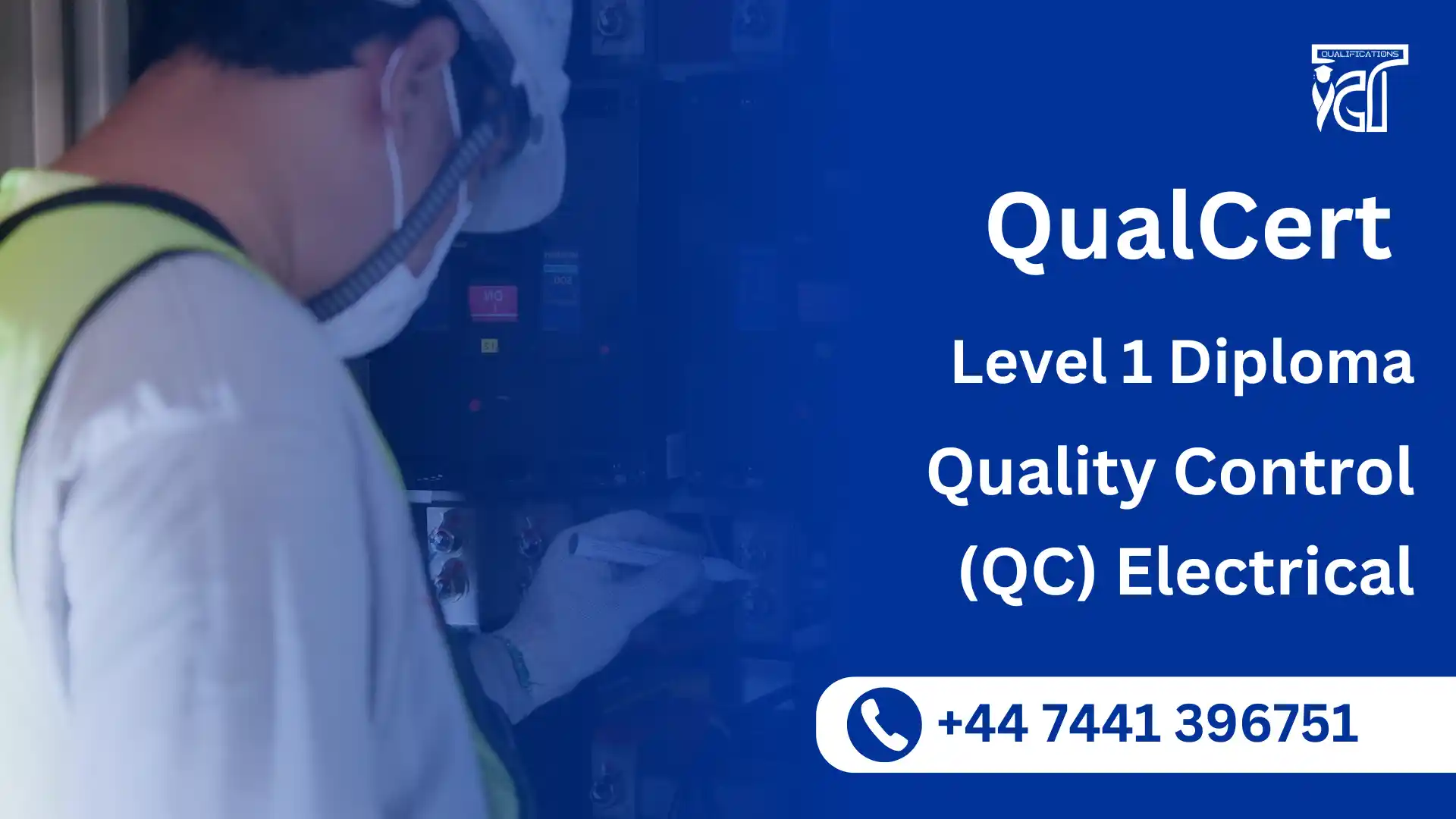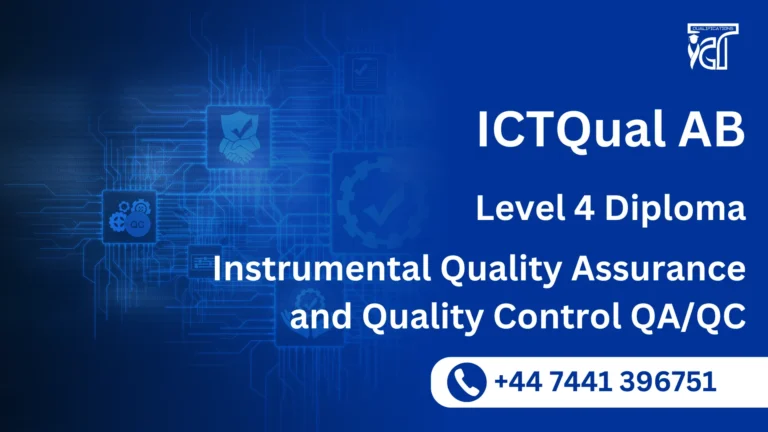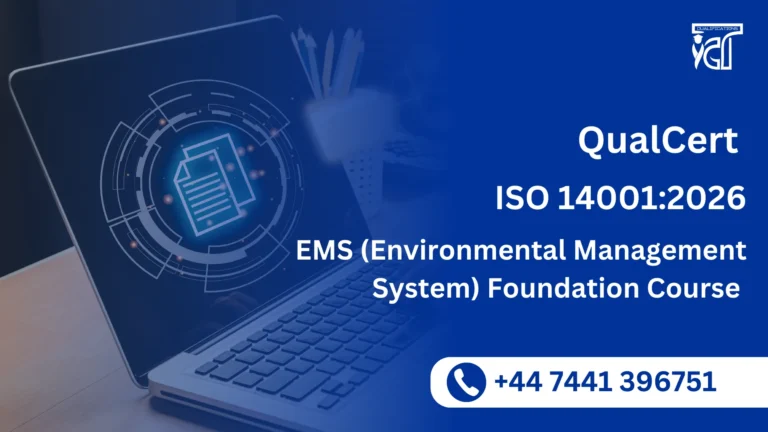The QualCert Level 1 Diploma in Quality Control (QC) – Electrical is an introductory qualification aimed at individuals who are new to the electrical field and interested in building a foundational understanding of quality control practices. This course is ideal for school leavers, entry-level technicians, or anyone seeking to begin a career in electrical quality assurance and inspection.
The program introduces the core concepts of quality control within electrical systems, including the basics of electrical safety, component inspection, calibration awareness, and the importance of following standard procedures. Learners will also explore the role of quality assurance in maintaining system performance and preventing faults.
Designed to be practical and accessible, the course equips learners with the essential knowledge and confidence to support quality control activities in real-world electrical environments. It also lays the groundwork for progression to higher-level QC qualifications or apprenticeships in electrical engineering and maintenance.
QualCert Level 1 Diploma in Quality Control (QC) Electrical
The QualCert Level 1 Diploma in Quality Control (QC) Electrical comprises several study units designed to provide learners with a comprehensive understanding of QC principles and practices in the electrical sector. Below is the qualification structure, including the Total Qualification Time (TQT) 180, Guided Learning Hours (GLH) 120, and 30 Credits associated with the program.
| Unit Ref# | Unit Title | Credit | GLH | TQT |
| QC100007 – 1 | Introduction to Electrical Quality Control | 5 | 20 | 30 |
| QC100007 – 2 | Electrical Circuit Testing and Compliance | 5 | 20 | 30 |
| QC100007 – 3 | Electrical Equipment Calibration | 5 | 20 | 30 |
| QC100007 – 4 | Safety Management in Electrical Quality Control | 5 | 20 | 30 |
| QC100007 – 5 | Quality Control Documentation and Reporting | 5 | 20 | 30 |
| QC100007 – 6 | Standards and Regulations in Electrical Quality Control | 5 | 20 | 30 |
GLH (Guided Learning Hours) and TQT (Total Qualification Time) are terms commonly used in vocational qualifications to help define the amount of time a learner is expected to spend on their studies.
1. GLH (Guided Learning Hours)
GLH refers to the number of hours a learner spends being directly taught, supervised, or supported during their course. This includes the time spent in activities such as:
- Classroom instruction
- Practical workshops
- One-on-one tutoring or mentoring sessions
- Online learning sessions with tutor support
In other words, GLH represents the time that learners are actively engaged with their instructors or learning activities.
2. TQT (Total Qualification Time)
TQT represents the total amount of time a learner is expected to invest in completing a qualification, including:
- GLH (Guided Learning Hours): Time spent on direct learning, as explained above.
- Self-Directed Learning: This includes time spent on independent study, research, assignment completion, preparation for exams, and any other work the learner does outside of direct teaching hours.
TQT is a broader measure that includes all the time required to achieve the qualification. It helps learners and employers understand the overall commitment required for the qualification.
Key Differences Between GLH and TQT:
- GLH focuses on direct learning with guidance or supervision.
- TQT includes GLH as well as independent study time and other learning-related activities.
Example:
If a qualification has a TQT of 600 hours and a GLH of 250 hours, it means the learner should spend 250 hours in direct learning (classroom, online, or tutor-led sessions) and 350 hours on independent study or research.
1. Introduction to Electrical Quality Control
- Gain a solid understanding of the basic principles of quality control in electrical applications.
- Recognize the role of quality assurance in ensuring the reliability and safety of electrical systems.
- Understand the duties and responsibilities of quality control personnel within the electrical industry.
2. Electrical Circuit Testing and Compliance
- Learn the fundamental methods and tools used in electrical circuit testing.
- Evaluate circuit performance to ensure compliance with relevant industry standards and safety protocols.
- Interpret testing results to detect faults and confirm circuit functionality.
3. Electrical Equipment Calibration
- Understand why accurate calibration is essential for electrical measurement equipment.
- Perform simple calibration procedures for commonly used instruments.
- Maintain documentation for calibration activities to support traceability and compliance.
4. Safety Management in Electrical Quality Control
- Identify typical hazards encountered during electrical inspections and implement effective safety precautions.
- Apply basic risk assessment techniques to ensure safe working conditions.
- Follow standard safety practices to minimize risk during quality control operations.
5. Quality Control Documentation and Reporting
- Develop skills in preparing detailed and accurate quality inspection reports.
- Keep clear and organized records to support compliance and traceability.
- Communicate inspection outcomes effectively to team members and supervisors.
6. Standards and Regulations in Electrical Quality Control
- Gain knowledge of national and international standards related to electrical quality control.
- Ensure all work adheres to applicable legal and regulatory requirements.
- Implement industry best practices to promote high-quality outcomes in electrical projects.
1. Foundational Knowledge of Electrical Quality Control
Learners gain a solid understanding of the basic principles and practices of quality control specific to the electrical field, providing a strong platform for further education or entry into the industry.
2. Improved Career Prospects
Completing this diploma enhances employability by equipping learners with essential quality control skills that are highly valued across electrical engineering, construction, and maintenance sectors.
3. Safety Awareness and Risk Reduction
The course emphasizes safe practices in electrical environments, enabling learners to recognize potential hazards, perform risk assessments, and apply measures that protect both personnel and equipment.
4. Hands-On Practical Skills
Students acquire fundamental practical skills, such as basic electrical circuit testing, equipment calibration, and inspection documentation—preparing them for real-world tasks in entry-level roles.
5. Understanding of Standards and Compliance
Learners become familiar with national and international electrical standards, promoting a culture of compliance and quality assurance aligned with industry expectations.
6. Smooth Progression Path
This diploma serves as an entry point to more advanced QC Electrical qualifications (such as Level 2 or Level 3), supporting continuous professional development and academic growth.
7. Ideal for Beginners and Technicians
It’s specifically designed for those new to the field or working in junior technician roles, offering a structured introduction to quality assurance in electrical systems without requiring prior specialist knowledge.
Ideal Learner for QualCert Level 1 Diploma in Quality Control (QC) – Electrical
1. Aspiring Electrical Technicians
This course is ideal for individuals who are beginning their journey in the electrical field and are looking to develop a foundational understanding of quality control processes relevant to electrical systems and components.
2. School Leavers and Career Starters
Students who have recently completed their secondary education and are seeking a technical vocational path will benefit greatly from this introductory-level qualification. It provides a clear gateway into the world of electrical inspection, testing, and compliance.
3. Entry-Level Workers in Electrical or Maintenance Roles
Those currently working in basic roles within electrical maintenance, construction, or installation services can use this qualification to build confidence, improve skills, and pursue more advanced roles in the quality control sector.
4. Individuals Seeking Career Change
Professionals from other fields who wish to transition into the electrical industry will find this course accessible, practical, and informative—requiring no prior experience but offering valuable, job-ready knowledge.
5. Apprenticeship and Vocational Program Participants
Learners enrolled in technical apprenticeships or vocational training programs can take this course to reinforce their learning and demonstrate proficiency in essential electrical quality control principles.
Entry Requirements
Entry Requirements: QualCert Level 1 Diploma in Quality Control (QC) – Electrical
Age Requirement:
Applicants must be at least 16 years of age at the time of enrollment. This ensures participants have the maturity to engage with basic technical and safety concepts.
Educational Background:
A basic secondary school education is recommended. While no formal qualifications are strictly required, learners should possess a general understanding of numeracy and literacy, as these are essential for interpreting technical information and completing assessments.
Work Experience:
No prior work experience in electrical or technical fields is necessary. This course is designed for beginners and individuals starting their journey into electrical quality control.
English Language Proficiency:
Learners should have a basic understanding of the English language, both written and spoken, as course materials and instructions are delivered in English. This will enable them to follow lessons, complete assignments, and understand safety documentation.
Register Now
Qualification Process
Qualification Process for the QualCert Level 1 Diploma in Quality Control (QC) Electrical
- Self-Assessment:
Begin by evaluating your eligibility to ensure you meet the qualification requirements, including work experience, knowledge, and language proficiency. - Registration:
Complete your registration by submitting the required documents, including a scanned copy of a valid ID, and paying the registration fee. - Induction:
An assessor will conduct an induction to confirm your eligibility for the course and explain the evidence requirements. If you do not meet the criteria, your registration will be canceled, and the fee will be refunded. - Assignmnets & Evidence Submission:
Provide all assignmnets and the necessary evidence based on the assessment criteria outlined in the course. If you are unsure of the required evidence, consult with the assessor for guidance on the type and nature of evidence needed. - Feedback and Revision:
The assessor will review your submitted evidence and provide feedback. Evidence that meets the criteria will be marked as “Criteria Met,” while any gaps will be identified. You will be asked to revise and resubmit if needed. - Competence Evidence:
Submit final evidence demonstrating that all learning outcomes have been met. This evidence will be marked as “Criteria Met” by the assessor once it is satisfactory. - Internal Quality Assurance (IQA):
The Internal Quality Assurance Verifier (IQA) will review your evidence to ensure consistency, quality, and compliance with standards. - External Verification:
The IQA will submit your portfolio to QualCert External Quality Assurance Verifiers (EQA) for final confirmation. The EQA may contact you directly to verify the authenticity of your evidence. - Certification:
Upon successful completion of all checks, QualCert will issue your official certificate, confirming that you have attained the QualCert Level 1 Diploma in Quality Control (QC) Electrical.







